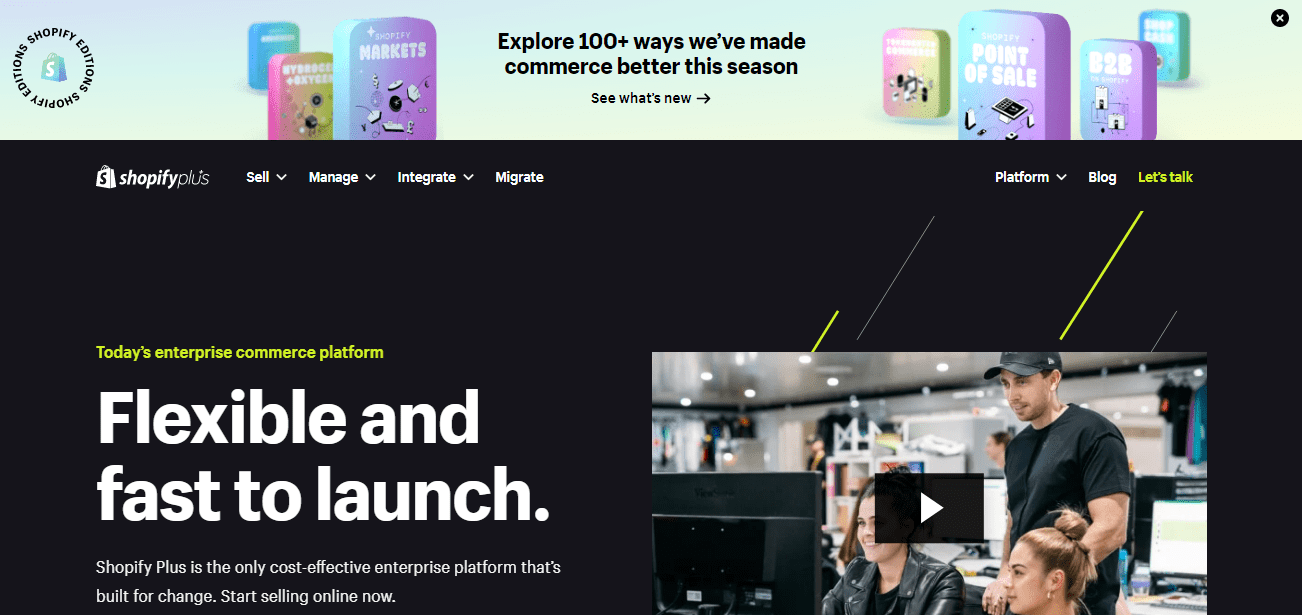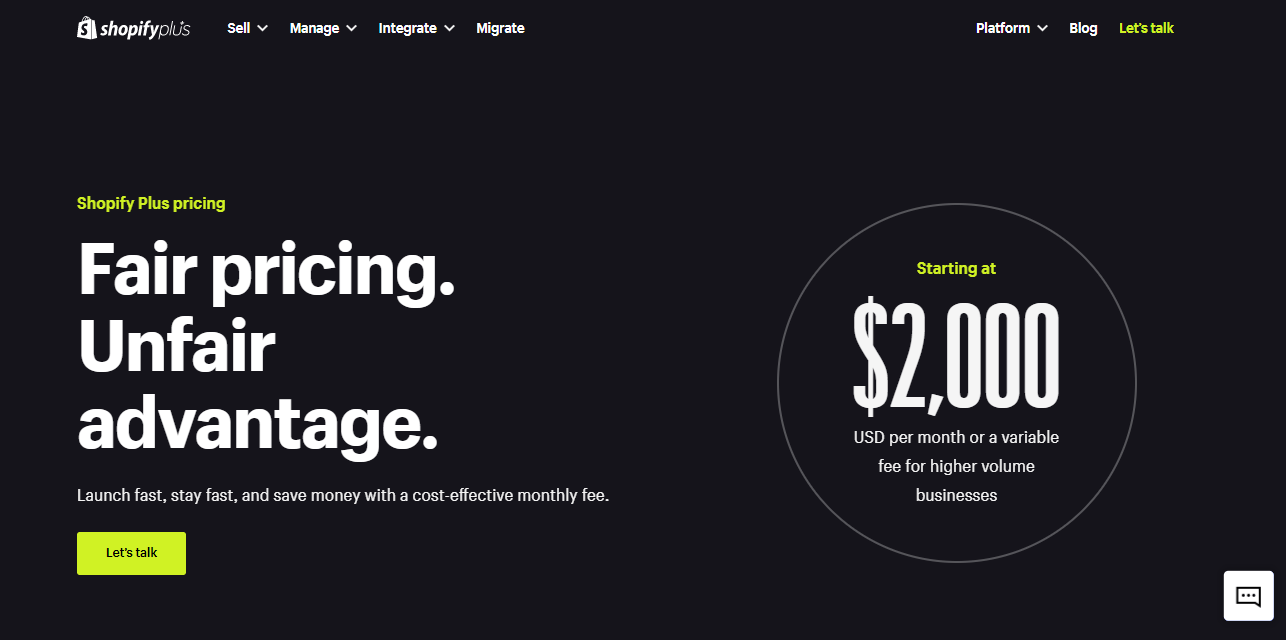Shopify Plus là gì? Đánh giá ưu, nhược điểm của Shopify Plus
- Nov 07 2024
- 1 views

Are you having trouble building your website with the current platform? Is your business a large-scale enterprise with rapid growth? So, you must be worried that the regular Shopify platform may not meet your usage needs, in addition to spending high operating and maintenance costs for the website. Or perhaps you are starting a completely new business but want to achieve rapid growth with powerful tools. Don't worry because Shopify Plus has been introduced to address these issues.
1. What is Shopify Plus?

Shopify Plus is an e-commerce website platform designed for enterprise-level customers with annual revenue (GMV) of $1 million or more and high growth rates. While Shopify is suitable for small and medium-sized businesses, Shopify Plus caters to larger-scale enterprises. Based on ShopOne's 5 years of experience in operating Shopify projects, the Plus version of Shopify is best suited for brands with a revenue volume of $5 million or more.
Why is this the case? It is because Shopify is built with powerful exclusive tools that help businesses grow rapidly and efficiently. Some of the world's largest businesses implementing Shopify Plus include Gymshark, Kylie Cosmetics, Redbull, Fashion Nova, Fenty Beauty, and more. In Vietnam, leading brands such as Durex Vietnam, Skechers Vietnam, Trollbeads Vietnam, Supersports, and others have chosen to trust Shopify Plus.
2. Price of Shopify Plus?

In the years before, Shopify did not officially disclose the usage fees for Plus, and this remained a mystery. However, since 2022, the official announced price for Shopify Plus starts from $2000 per month. This is just the monthly cost for Shopify Plus, and you would also need to pay additional fees for third-party apps and website development on the Shopify Plus platform. If you're wondering about the steep cost of the Plus version, the answer lies in the outstanding advantages evaluated below, based on ShopOne's experience.
3. Shopify Plus’ advantages
Easy to use
With the characteristics of a SaaS e-commerce platform, Shopify Plus is designed to be user-friendly, for businesses without strong technical expertise to quickly build and operate websites. Additionally, with Shopify Plus, businesses don't need to worry much about server management, security, or website updates and maintenance. This helps businesses save a significant amount of time to focus on more important tasks such as sales, marketing, and customer care.
Powerful processing speed
Shopify Plus provides powerful processing speed not only for the entire website but also for the Checkout page. The Checkout page of Shopify Plus has a significantly faster processing speed compared to the regular version, which helps promote the customer conversion rate.
Imagine you are running ads and experiencing a surge in traffic during special occasions like Black Friday or the holiday season. If your website suddenly becomes congested or encounters errors, what would happen? Shopify Plus can handle a massive amount of traffic while ensuring fast web browsing speed and an optimal customer experience. It can process over 10,000 orders per minute.
High-quality customer support services
Shopify Plus offers 24/7 customer support services and dedicated account managers who can assist businesses in quickly resolving any issues or questions that arise through email, chat, and hotline. This level of support is particularly crucial for larger businesses that may have more complex needs and require a higher degree of personalized attention.
The built-in supporting tools
The integrated tools are another advantage of Shopify Plus, supporting businesses in building and managing their e-commerce websites. These tools include product management, inventory tracking, payment processing, shipping, tax calculation, advanced analytics, and more.
Additionally, Shopify Plus provides a wide range of customizable templates and apps, allowing businesses to create modern, professional, and feature-rich e-commerce websites without requiring high technical expertise. The utilities of Shopify Plus also enable businesses to easily scale their operations as their needs change over time.
Furthermore, by choosing Shopify Plus, businesses have full access to Shopify's exclusive programs such as the Merchant Success Program, Shopify Plus Academy, Shopify Plus Partner Program, and the Shopify Plus community on Facebook.
High scalability
Unlike the original Shopify version, Shopify Plus has become a popular choice for large-scale businesses due to its high scalability. The platform can easily scale up or down based on the business's needs, effectively handling increased website traffic and surges in orders during peak shopping seasons or promotional events.
Customizing ability
One of the significant advantages of Shopify Plus lies in its high level of customization, allowing businesses to tailor their e-commerce websites to specific needs, such as customizing templates, apps, payment integrations, and more.
As a result, the e-commerce website built on Shopify Plus becomes unique and creative, showcasing the brand image and providing customers with an outstanding shopping experience. The flexibility in customization has made Shopify Plus a powerful tool to drive online sales and sustainable growth.
High security
Security is a top priority for e-commerce businesses, especially those with large-scale operations. Shopify Plus is a PCI-compliant platform that meets the data security standards of payment cards, ensuring that all payment transactions processed through the platform are secure.
All customer data is encrypted using SSL, protecting sensitive information from unauthorized access. Additionally, Shopify Plus integrates a built-in DDoS protection feature, which safeguards against dangerous attacks that can disrupt website traffic and accessibility.
4. Drawbacks of Shopify Plus
Poor content management
Content management is not a strong suit of both Shopify and Shopify Plus compared to other platforms, especially WordPress. One of the limitations to mention is the limited blogging functionality, which makes it challenging to create and manage blog categories on the website.
Moreover, if content is a crucial aspect of the marketing strategy, this limitation should be considered as it can significantly impact SEO optimization. Another limitation is the lack of control over the URL structure of product pages, which poses constraints on optimizing URLs for search engines.
Overall, while Shopify Plus provides many features for businesses to build and manage their e-commerce websites, if content management is a top priority, it may be worth considering other platforms that offer more advanced content management capabilities.
Over-reliant on the original platform
If a business builds a website based on open-source software, it is relatively simple to switch between platforms, and the business retains ownership of the source code and all data. However, the situation is different for SaaS platforms.
Shopify Plus is a SaaS platform, and the entire website system of the business is hosted on Shopify's servers, which means that ownership and control of the source code and data belong to Shopify Plus. This implies that the data related to e-commerce activities on the website becomes tightly linked (lock-in) to Shopify's database.
Supplier risks
Assuming that Shopify was to go bankrupt or face unforeseen risks, all business operations on this platform would be lost, and it would not be possible to retrieve the most up-to-date data. However, it is important to note that this risk is unlikely to occur.
Exporting data
In the event of discontinuing the use of Shopify and migrating to another platform, businesses can export data into a CSV file containing product information, customer accounts, inventory, orders, etc. However, it's important to note that the data Shopify allows for retrieval may not be sufficient but only a portion of it.
High expertise requirement
Although Shopify Plus is known for being user-friendly and accessible to users without strong technical skills, implementing effective e-commerce with Shopify Plus requires a certain level of specialized knowledge. Shopify Plus is a highly customizable platform, so businesses need to have a certain understanding and collaborate with experienced developers to maximize the platform's features and capabilities.
Budget to implement Shopify Plus
The cost of using Shopify Plus is calculated based on revenue. Initially, each business will pay a minimum of $2,000 per month for standard setup and integration. Once reaching a monthly revenue of $800,000, Shopify Plus will charge a revenue-based payment of 0.25% of the revenue per month. However, the fee will not exceed $40,000 per month or $480,000 per year.
5. Should we spend money on Shopify Plus or not?
The advantages of spending money on Shopify Plus:
At first glance, this may seem like a large amount of money, but for large-scale businesses, this price is reasonable because Shopify Plus provides a powerful e-commerce platform that helps businesses operate more efficiently compared to standard Shopify packages.
1st reason:
As mentioned, the main advantage of Shopify Plus lies in its scalability and customization capabilities. This, in turn, is a disadvantage of standard Shopify packages. A growing business will require an e-commerce platform that can effectively meet the needs of expansion and development.
Shopify Plus is designed to handle high sales volumes and can support 10,000 transactions per minute. Additionally, businesses can customize their e-commerce websites and leverage built-in features and tools to optimize their operations, management, and sales processes.
2nd reason:
Another advantage of Shopify Plus is that businesses do not have to pay for hosting, bug fixes, maintenance, or updates. The additional fee that businesses need to pay is the transaction fee, specifically:
The credit card transaction fee that businesses have to pay to Shopify Plus will vary depending on the country but typically ranges from 1.5% to 2.5% per transaction.
Additionally, Shopify Plus will charge a small fee of around 0.15% for transactions with third-party payment gateways, but this fee is waived if the business's web store accepts Shopify Payments as a payment method.
Compared to the three standard packages of Shopify, the credit card transaction fees of Shopify Plus are still relatively low, with the following differences:
Basic ($29/month) - 2.9% + 30 cents per transaction
Shopify ($79/month) - 2.6% + 30 cents per transaction
Advanced ($299/month) - 2.4% + 30 cents per transaction
Shopify Plus (starting from $2000/month) - 2.15% + 30 cents per transaction (fee reference for the US market)
→ It can be seen that compared to the highest package of standard Shopify - Advanced, the credit card transaction fee of Shopify Plus will save businesses 0.25%.
3rd reason
Shopify has a vast app store with over 6,000 apps developed by Shopify and third-party developers. What's special is that there are now many apps specifically developed for Shopify Plus. Depending on the needs of each business, the cost of installing apps can range from $0 to a few hundred or even a few thousand dollars per month.
The basic setup of the Shopify Plus platform is sufficient for businesses to operate and manage their websites. However, to deploy more efficiently and provide a better customer experience, businesses may need to install additional Shopify apps, which incur costs. Naturally, with the investment in these apps, businesses will reap corresponding benefits.
Với bản chất là nền tảng thương mại điện tử SaaS, doanh nghiệp sẽ không thể sở hữu mã nguồn và dữ liệu website và điều này đưa đến nhiều bất lợi về chi phí. Đối với các doanh nghiệp đã đạt đến cấp độ sử dụng Shopify Plus thì nhu cầu sử dụng các tính năng, ứng dụng, công cụ hỗ trợ, tích hợp với bên thứ 3 là rất lớn.
The disadvantages of spending money on Shopify Plus:
In essence, as an e-commerce SaaS platform, businesses cannot own the website's source code and data, leading to various cost-related disadvantages. For enterprises that have switched to using Shopify Plus, the demand for utilizing features, applications, third-party integrations, and supportive tools is substantial.
In addition to the fixed monthly cost of using Shopify Plus, businesses also have to pay for the regular use of utilities every month. This makes it difficult to manage cash flow for large-scale websites.
On the other hand, with open-source platforms, although the deployment costs may be high and the implementation time may be longer, businesses will pay all the costs at once and own the source code, data, and long-term features. Therefore, cash flow management will become more efficient and convenient.
Conclusion:
If you have come this far, I can assume that you now understand Shopify Plus better. And that you know what to expect from it. Shopify Plus, in all its glory, has some downsides but needless to say, the pros outweigh the cons.
With years of experience in implementing e-commerce solutions for businesses across multiple countries, ShopOne understands the potential of Shopify Plus for businesses as well as the challenges and difficulties that arise when starting to build.
Contact ShopOne today to receive a free consultation.


